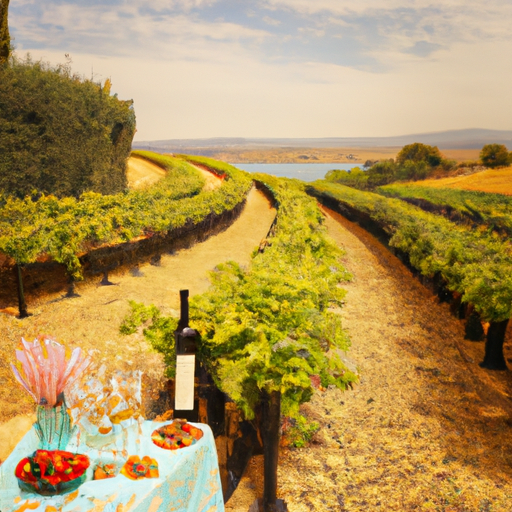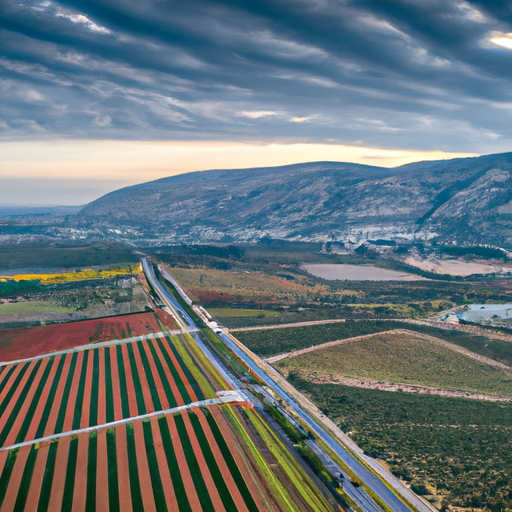Embark on a journey through the Israeli wine route, exploring some of the country's finest vineyards and wineries. This blog post will take you on a wine tasting adventure, showcasing the diversity of wine varietals, the unique wine-making methodologies, and the culture surrounding wine in Israel.
1. 'In Vino Veritas': A Historical Overview of Israeli Wine
For centuries, wine has held a significant place in the cultural and religious traditions of Israel. The history of winemaking in this region dates back thousands of years, with evidence of vine cultivation and wine production found as early as biblical times. In fact, the Bible contains numerous references to wine, emphasizing its importance in ancient Jewish society.
During the Roman period, winemaking in Israel flourished, with vineyards stretching across the hillsides of Judea and Galilee. However, the production of wine declined in subsequent centuries due to various factors, including foreign invasions and religious restrictions. It wasn't until the late 19th century, with the arrival of Jewish settlers, that winemaking experienced a revival in the region.
The modern Israeli wine industry began to take shape in the 1980s, as pioneers and visionaries recognized the potential of the country's diverse terroir and climate. They imported new grape varieties and implemented modern winemaking techniques, resulting in the production of high-quality wines that quickly gained international recognition.
Today, Israel is known as one of the world's emerging wine regions, with a reputation for producing exceptional wines that reflect the unique characteristics of the land. From the rolling hills of the Galilee to the arid landscapes of the Negev Desert, each wine region showcases its own terroir, resulting in a wide range of styles and flavors.

1. A panoramic view of sun-drenched vineyards in the Galilee region.
2. Is there more to Israeli wine than Cabernet Sauvignon and Merlot?
Absolutely! While Cabernet Sauvignon and Merlot have become synonymous with Israeli wine, there is a lot more to explore and discover in this dynamic wine region. Over the years, winemakers in Israel have been experimenting with a wide range of grape varieties, resulting in a diverse and exciting selection of wines.
One such grape variety that has gained popularity is Shiraz (Syrah). Known for its bold and robust flavors, Israeli Shiraz wines offer a rich and concentrated palate, with notes of dark fruits, spices, and a hint of black pepper. This varietal thrives in the Mediterranean climate of Israel, particularly in the Galilee region, where the cool mountain breezes and volcanic soils create ideal growing conditions.
Another grape variety that has been making waves in the Israeli wine scene is Sauvignon Blanc. This white wine grape, originally from France, has found a new home in the vineyards of Israel. Known for its vibrant acidity and tropical fruit aromas, Israeli Sauvignon Blanc wines are refreshing and crisp, making them perfect for warm summer days or pairing with fresh seafood dishes.
In addition to these lesser-known varieties, Israeli winemakers are also producing exceptional wines from indigenous grape varieties, such as Carménère, Malbec, and Petite Sirah. These grapes, which have a long history in the region, offer unique flavors and characteristics that are distinct to Israeli terroir.
3. 'To visit a winery is to discover a terroir': Exploring the Geographical Diversity
When embarking on a wine tour in Israel, one cannot overlook the significance of exploring the geographical diversity that contributes to the unique terroir of the region. From the lush, green landscapes of the Galilee to the arid desert terrains of the Negev, each winery showcases the distinctive characteristics imparted by its surroundings.
Tour the Galilee region: with its rolling hills and cool climate, is home to numerous vineyards that produce elegant and complex wines. The combination of volcanic soils, ample rainfall, and temperature variations creates an ideal environment for growing grapes that yield expressive flavors and balanced acidity. Visitors to this region can immerse themselves in the breathtaking beauty of the vineyards while savoring the earthy and fruity notes of the wines.
On the other hand, the Negev region offers a stark contrast with its desert landscapes and extreme temperatures. Despite the challenging conditions, winemakers in this area have successfully cultivated vineyards that produce intense and concentrated wines. The sandy soils and limited water resources result in grapes with deep flavors and a distinct character. Exploring the wineries in the Negev allows visitors to witness the resilience and ingenuity of winemakers who have embraced the harsh environment to create exceptional wines.
In addition to these well-known regions, Israel's wine route includes the Judean Hills, Samaria, and the Golan Heights, each with its own microclimate and terroir. From the Mediterranean influences of the coastal plains to the altitude and volcanic soils of the Golan Heights, every stop on the wine route presents an opportunity to experience the diversity of Israel's winemaking heritage.

3. An aerial view capturing the geographical diversity of Israeli vineyards, from cool high-altitude sites to hot desert plains.
4. From Vine to Bottle: The Art of Israeli Winemaking
Israeli winemaking is a fine art that encompasses meticulous attention to detail and a deep respect for tradition. From the moment the grapes are harvested to the final bottling process, every step is carefully executed to ensure the highest quality wines.
The journey begins in the vineyards, where experienced viticulturists carefully tend to the vines throughout the year. Skilled hands prune, train, and nurture the grapevines, allowing them to thrive and produce the best quality fruit. The selection of the optimal grape varieties for the specific terroir is crucial, as it sets the foundation for the flavors and aromas that will be expressed in the wines.
Once the grapes reach their peak ripeness, they are meticulously handpicked and transported to the winery for processing. The grapes are carefully sorted to remove any unwanted material and ensure that only the best fruit is used. From here, the winemaking process begins, with a delicate balance of science and artistry.
The grapes are gently crushed, and the juice is extracted to begin fermentation. Winemakers carefully monitor the temperature, yeast strains, and fermentation duration to coax out the desired flavors and characteristics from the grapes. Aging, whether in stainless steel tanks or oak barrels, adds complexity and depth to the wines, allowing them to develop their full potential.
Finally, the wines are carefully blended, filtered, and bottled. Each bottle is a testament to the winemaker's skill and dedication to producing a wine that truly reflects the essence of the grapes and the terroir. Whether it's a fresh and vibrant white wine or a bold and robust red, Israeli winemakers strive to create wines that captivate the palate and tell a unique story.
Israel's wine route offers an immersive experience that combines cultural exploration with gastronomical delight. From boutique to world-renowned wineries, each vineyard tells a unique story, complemented by the diverse array of wines produced. A tour through this wine route is a testament to Israel's rich, evolving wine culture that any wine enthusiast, novice, or connoisseur would appreciate.
